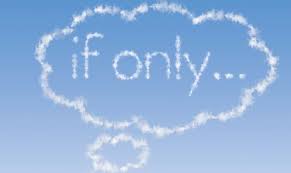My daughters exams are going on. Today she came home after writing her paper. As all parents, we asked her, “How was it?” and her reply was – “If only, I had practiced integration a bit more”. And then she mumbled what all she could have done better, if only… I smirked and asked her “who stopped you?”How often and how easily we use these words “
if only” in our lives? Whenever things go awry, or not as planned, we start wondering
if only we had made another choice, if only we had done things differently. “
If only I had followed what my boss said”, “
if only the economy was good”, “
if only I had spent some more time with my grandparents”, “
if only I had not taken that loan”, “
if only that customer had given the order”, “
if only I had been careful”, “
if only I had worked hard” and many such if’s have become a part of our vocabulary.So what’s wrong with that, one may wonder. After all, we are only thinking about how we could have taken a better, wiser and a more appropriate decision. The issue is that the moment we say if only, in our subconscious mind, we are shirking away from our responsibilities. We are now ready to blame others, our environment and our own wisdom when we took that decision. We are merely focused on what was wrong and what could have been right. And then we just resign to the facts as they are.The moment we say “if only”, we tell ourselves that we do not intend to do anything about the situation. We move into the realm of wishful thinking rather than real action. We refuse to accept that we could have made a difference. We only believe that if circumstances were right, outcomes would have been in our favor. As Stephen Covey mentioned in the book 7 Habits of Highly Effective People, we push the issue out of our circle of influence into the circle of concern. As a result, we give away the control to change the situation.

Mulling over the “if only’s” is like doing a post mortem. It’s not going to make the dead alive. Thinking about the past is not going to change the present. What we did in the past, was based on the best possible information and knowledge that we had. We have to accept our decisions and be willing to bear the results of those. What can make a difference now, is dependent on the actions we take now. Not wondering “if only”, but thinking “
what next”. Instead of saying “if only the economy was better”, lets say “
what should be my
next action to improve my business in spite of the bad economy”. The moment we change our paradigm to “
what next”, we start taking responsibility and owning up our actions and results thereof.To conclude, “
if only you stop using if only”,
nah! “ by focusing on
what next” will you be the master of your destiny and Achieve ThySelf!

 Mulling over the “if only’s” is like doing a post mortem. It’s not going to make the dead alive. Thinking about the past is not going to change the present. What we did in the past, was based on the best possible information and knowledge that we had. We have to accept our decisions and be willing to bear the results of those. What can make a difference now, is dependent on the actions we take now. Not wondering “if only”, but thinking “what next”. Instead of saying “if only the economy was better”, lets say “ what should be my next action to improve my business in spite of the bad economy”. The moment we change our paradigm to “what next”, we start taking responsibility and owning up our actions and results thereof.To conclude, “if only you stop using if only”, nah! “ by focusing on what next” will you be the master of your destiny and Achieve ThySelf!
Mulling over the “if only’s” is like doing a post mortem. It’s not going to make the dead alive. Thinking about the past is not going to change the present. What we did in the past, was based on the best possible information and knowledge that we had. We have to accept our decisions and be willing to bear the results of those. What can make a difference now, is dependent on the actions we take now. Not wondering “if only”, but thinking “what next”. Instead of saying “if only the economy was better”, lets say “ what should be my next action to improve my business in spite of the bad economy”. The moment we change our paradigm to “what next”, we start taking responsibility and owning up our actions and results thereof.To conclude, “if only you stop using if only”, nah! “ by focusing on what next” will you be the master of your destiny and Achieve ThySelf!
comments (00)